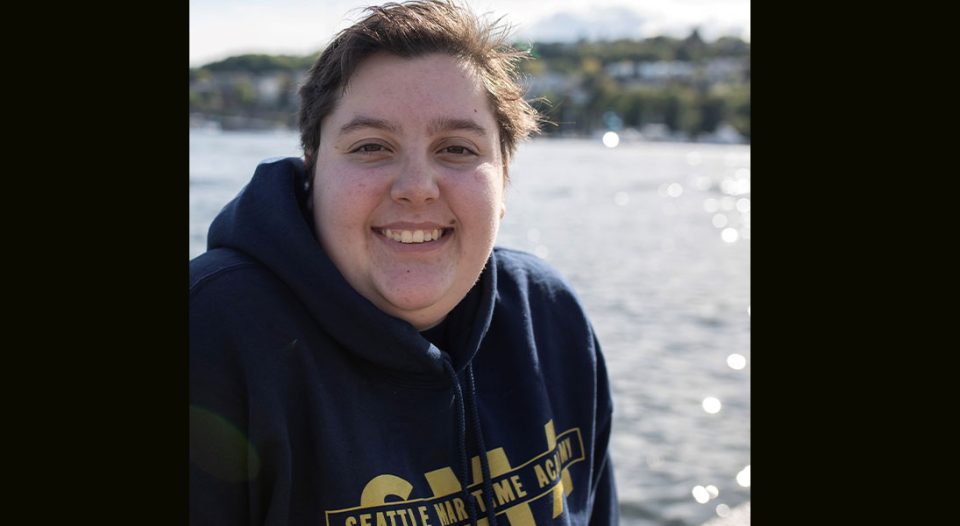Seattle Maritime Academy student, Girl Scouts of the USA Gold Award recipient
Immanuel Lutheran Church, Seattle
I graduated high school this year, but I had been involved in youth group at both churches I attend, Immanuel and University Congregational UCC in Seattle. In both of my youth groups I feel loved and supported for exactly who I am. I don’t feel like I have to change any of my authentic self. I’ve felt supported, no matter what.
I also help with children’s ministry, teach Sunday school and served on the church council as the Christian formation representative. I’m starting a new project to look at disability justice and inclusion in the church.
To me, church community means having a group of like-minded individuals who have the same values. Who also understand similar struggles of being a Christian in 2024. It also is important to me because I know that I have a group of people that I can reach out to if I ever need support throughout my life.
I’m currently enrolled at the Seattle Maritime Academy in their deckhand program. I will learn about navigation, basic boat maintenance, emergency survival craft and what it takes to work in the maritime industry. I also have a part-time job at Climate Pledge Arena, Seattle’s WNBA and NHL stadium.
Having dyslexia, dyscalculia, dysgraphia and ADHD means I’ve been different than “typical.” I am divergent. But I prefer the term neuro-spicy. I’ve had really supportive communities—my churches and youth groups, Girl Scouts, my friends. That is where I can be myself. I know God loves neurodivergent people and that we are wonderfully made.
The Girl Scouts’ Gold Award is a very hard award to achieve—only 5% of Girl Scouts earn it. The Gold Award is a service project but to the extreme. To earn it I had to spend a minimum of 80 hours working on a project, reach outside of my immediate community, and have it be applicable and ongoing after I completed it. I knew I wanted to work on disability justice in some kind of way. My project was to make churches more accessible and inclusive to neurodivergent people, with a specific focus on children and youth ministry because that’s what I’m passionate about. I knew that this project would benefit a lot of the small children and youth in my church.
I knew I wanted to work on disability justice in some kind of way.
The process started with me researching a lot about what neurodivergence is and figuring out how to share it with a neurotypical audience. I am neurodivergent, but I only know what it is because it is what I live with. So I had to figure out a good way to share it. I also looked at how fidget toys and sensory bins can be helpful tools for neurodivergent youth.
I took all this research and prepared a training—a slideshow, a resource list and a booklet—for people to learn about this work and learn how to implement it at their own church. I also held a training on Zoom. I hoped 10 or 12 people would show up, but I ended up with about 50 people from all over the country, and even a few from Canada. I also created a Linktree landing page where I could link all of the resources I developed.
Making congregations and youth groups more inclusive to neurodivergent people is very personal for me. I want to make sure that, no matter what, people are loved and accepted in their youth group. I’ve had very supportive youth groups, and having fidget choice and sensory bins were very important to me and my feeling welcome and included in churches. So I wanted to share that with other people.
I passed out fidget key chains with my Linktree information attached at the ELCA Youth Gathering this summer because Girl Scouts needed a very specific way that I would reach my community that was not just local. So this seemed like the easiest and most practical way to massively spread my information to my target audience. Plus, I heard about other youth groups that bring small things to share with other youth, like buttons or friendship bracelets. This felt like a good way to meet people and to spread the message of inclusion.
My Youth Gathering experience started at the tAble. It was incredible to be in a space with other youth with disabilities, and I felt like I could be myself without being afraid of what people think. I also really appreciated the mass gatherings because I’ve been wanting to go to the Youth Gathering for quite a long time. I really connected with the music, the dancing and the speakers. I loved how they had a mix of adults, young adults and youth so that everyone, no matter their age, would find someone that they connected with.
In high school I had the opportunity to spend two weeks on a tall ship called the Adventurous. This got me excited about maritime work. My junior year I split my time between high school and a vocation program focused on maritime. Through my teacher, I found out about an internship with the Virginia Five, which is the last working steamship of the mosquito fleet ferry system in Seattle. It’s a national historic landmark built in 1921. I applied and got the internship! A lot of my work was helping with hospitality for private events. But I also got to do line handling coming in and out of the docks. Sometimes I got to steer the ship under the supervision of the captains.
Entering into maritime work, I want to make sure everyone feels welcome.
Entering into maritime work, which is made up of mostly middle-aged men, I want to make sure everyone feels welcome. I want to be on a boat where people can be their true authentic selves. Wherever I am, I’m going to work to make sure people feel welcome and that they can be themselves.
I also served as an intern with Teen Feed, an organization in Seattle. It offers a hot meal to teens experiencing homelessness every day of the year, no matter what. They also offer services to help find people caseworkers and donated items such as clothes and hygiene products. My volunteer role was as an ally—I got to welcome folks and check them in. It gave me an opportunity to learn about other people’s life experiences, and I got to know a few of the guests. I learned that although these people are experiencing homelessness, they’re really just like any teenager—they like the same things and just want a place where they are accepted and safe.
I have seen God through all of the people that I’ve met at church. I have a lot of “church parents”—other adults that helped like parents when I was at church—who have looked out for me throughout the years. Now I hope to be a mentor for other kids.
I pray for the safety and health of my friends and family, for an end to gun violence and for peace. I pray that folks can find community where they can be their true authentic self.
To me grace means the understanding that we are all human—no one’s perfect—and that if you make a mistake, congratulations, you’re not a robot! And you need to understand that making mistakes is how you realize that you can’t learn without making mistakes. And none of that changes God’s love for us.
I’m a Lutheran because it is a loving community across generations. Growing up I had all these grownups in my life because of church—I had elders around me and young adults helping out with youth programs. All these people told me the grace of God is forever and for everyone. I learned I may not know everyone’s situation, so I don’t know why they might react a certain way. But if I understand that they are human and they might’ve been going through a hard time, that really helps me. That’s showing grace.
Find Eleanor’s resources here. If you’d like to nominate someone for “I’m a Lutheran,” email livinglutheran@elca.org.






